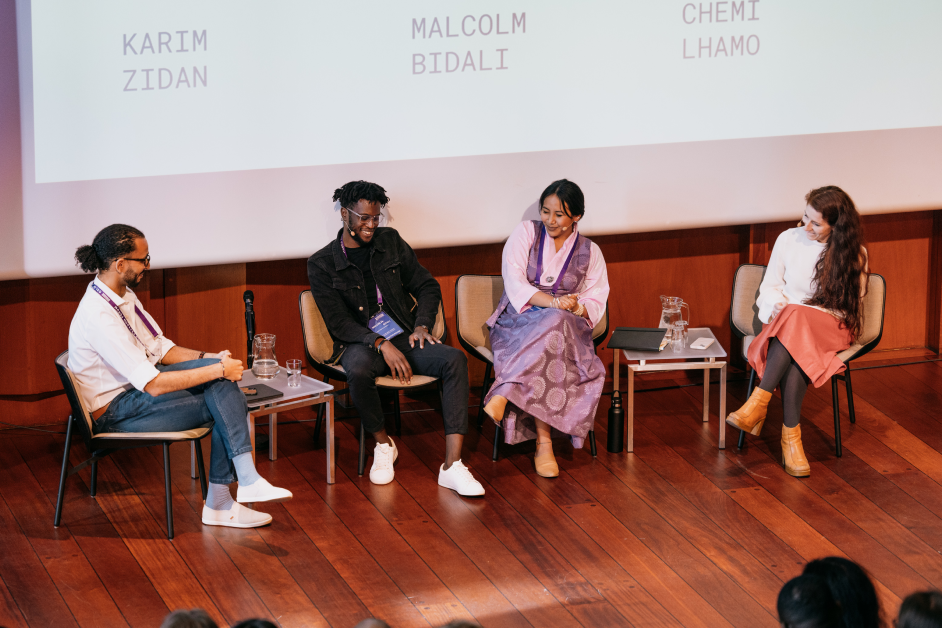
Wear Your Values Program Mentorship Application
Guiding Fashion Designers Toward Transparent, Responsible Production

Wear Your Values Program Mentorship Application
Guiding Fashion Designers Toward Transparent, Responsible Production
The Human Rights Foundation (HRF) is a nonpartisan, nonprofit organization that promotes and protects human rights globally, with a focus on closed societies.
HRF unites people in the common cause of defending human rights and promoting liberal democracy. Our mission is to promote freedom where it is most at risk in the world.

Since 2017, HRF’s Wear Your Values (WYV) program has encouraged dialogue about human rights in the fashion industry.
The fashion industry is one of the world’s largest industries and employs millions of people globally. Countries ruled by authoritarian regimes often house the most labor-intensive stages of production, leaving workers extremely susceptible to human rights violations without any path of recourse. WYV aims to promote transparency in global supply chains and create awareness of the hidden social costs of the industry. We bring attention to the people affected by poor practices in the fashion industry — and not only the environment, which has been the focus of most organizations working in the space of sustainable fashion.
About the Mentorship Program
With support from the Fashion Incubator San Francisco (FiSF), HRF has launched a one-year mentorship program for designers who aim to incorporate ethical practices into their work. Ethical clothing is defined as clothing that is free from human rights abuses, such as forced labor. The mentorship program will fall under HRF’s work in the Wear Your Values program and will allow designers to connect with industry leaders, experts, and veterans in the field who can aid designers with these goals. In line with HRF’s mission, designers must demonstrate a commitment to eliminating human rights abuses in all stages of the fashion industry, from raw material to sourcing through production to the final product.
Designers are invited to submit a proposal outlining a particular challenge in their business which they wish to achieve, as it relates to increasing ethical practices. Examples of challenges to overcome could include: sourcing more ethical materials to make designers’ clothing; exploring how ethical clothing can be made more affordable; or adding additional human rights aspect to designers’ clothing.
At the conclusion of the year-long mentorship program, designers will showcase their work, including learned experiences explored through trial and error and the evolution of the work during the mentorship program, in a format to be agreed upon among the designer, mentor, and HRF. This will culminate in at least one produced item of clothing or accessory. If the designer can create a sample collection or an entire collection, that is of course welcome.
Once the designer is selected, the designer will work with the mentor, as well as others in the community, to tackle the issue outlined in the initial proposal.
Criteria for Designers
Alignment with HRF’s Mission
Designers must demonstrate a strong alignment with HRF’s mission of promoting human rights in countries ruled by authoritarian regimes, as identified by HRF’s Tyranny Tracker classifications.
Create Ethical Clothing
Designers must already create ethical clothing, or have the goal of working toward ensuring their brand is ethical. This must include clothing that is made free of forced labor and modern slavery and which aims to protect the environment.
Portfolio of Work
Designers will need to provide a portfolio of their work to the selection committee, as well as a proposal on how the work they will do during the mentorship program will add to their scope of work, or how it will fill a gap.
Concrete Problems
Designers must have concrete problems or ideas that they want to address throughout the mentorship program and that would help further their practice/career.
Desire to Engage
Designers should have a desire to engage with other designers and industry professionals through programming or events.
Willing to Learn
Designers should be willing to learn from other designers and members of the HRF community, as well as to share best practices.
Willing to be Part of Marketing Campaigns
Designers should be able and willing to be a part of HRF’s social media and marketing campaigns.
Own Space
Designers will need their own space, materials and machinery to work with.
Able to Travel to OFF
Designers should be able to travel to the Oslo Freedom Forum (OFF) to meet other designers in the mentorship program and the rest of the HRF/OFF community.
Apply Now: Wear Your Values Mentorship Program
*Required Fields

